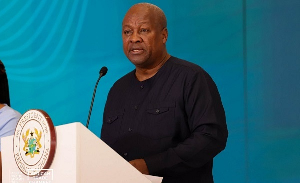The Ghana Revenue Authority (GRA) has established a Debt Management and Compliance Enforcement Unit to optimize revenue collection by reducing debt stock of taxpayers.
The unit is expected to spearhead and coordinate debt management and compliance activities in GRA offices countrywide.
Speaking at ceremony to inaugurate the unit in Accra, George Blankson, Commissioner General of the GRA, said the level of debt stock in the books constitutes a significant challenge to the Authority’s operations.
He noted that since there is the tendency for taxpayers not to keep the right books and avoid the payment of taxes, there is the need to monitor more closely debts owed by taxpayers, recover them and enforce the tax laws rigorously.
The move would also address revenue leakage, raise collection levels and bring tax to GDP ratio in line with appropriate international standards.
“It is envisaged that this new unit will holistically look at this challenge and find appropriate solution.”
He explained that the establishment of the unit is not meant to duplicate the work of the various enforcement and debt management units of the domestic tax revenue and customs divisions but coordinate and support debt management units.
Maxwell Tsatsu, head of the Debt management and Compliance Enforcement Unit, who spelt out the functions of the unit, said it has a responsibility to monitor trends in debts owed by taxpayers, manage recovery of debts, indentify and undertake appropriate action to enforce compliance.
The measures to be applied in debt recovery, he noted, would include serving of demand notices, carrying out payment reminder visits, closing premises and levying of distress warrants.
The unit would institute compliance enforcement measures such as penalties for late and non filling of returns or non-payment among others.
It is envisage that the unit would facilitate information sharing among departments, promote voluntary compliance by rendering non-compliance unattractive and creating a uniform organizational approach to debt recovery.
Enoch Cobinnah, Chief Director at the Ministry of Finance and Economic Planning, observed that voluntary compliance to tax payment was not part of the culture of many institutions and individuals.
He stated that the establishment of the unit would enhance revenue inflow to the state to enable government meet its numerous development needs.
He urged the officials who, would work in the unit, not to use their new positions for personal gains but ensure integrity and fairness.
“A year by this time we will demand accountability on the debt stock. So you must retrieve outstanding debts.”
Business News of Saturday, 22 December 2012
Source: Daily Guide












